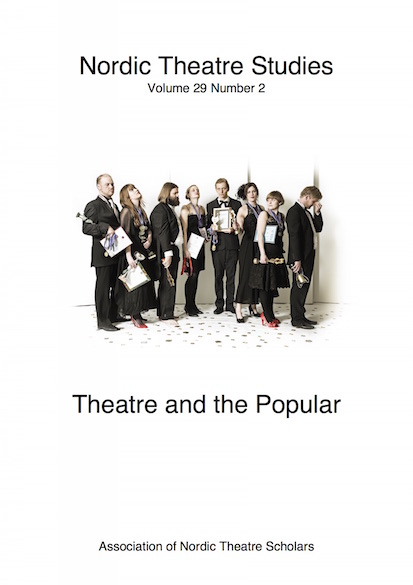The Valuation of Popular Theatre Performances: The Forgotten Success Story of Ljungby horn
DOI:
https://doi.org/10.7146/nts.v29i2.104603Keywords:
Popular Theatre, Mediatization, Spectacular, Ranft, Historiography, Ljungby hornAbstract
Albert Ranft started as an actor in touring theatre companies in the 1880’s, but soon became responsible for one of the most important groups. Twenty-five years later, he ran a big company with about 2500 employees, owned theatres in Stockholm and Gothenburg as well as a couple of touring companies.
His repertoire was based on popular entertainment plays, revues, operettas, historical plays, contemporary dramas etc. Simultaneously, his companies could offer ‘highbrow’ and ‘lowbrow’ productions. Even the actors could, during just one week, work in different genres. The way of programing was for Ranft an art form by itself, and sometimes he even acted in and directed the plays.
In November 1893, at Stora Teatern in Gothenburg, he premiered a fairy tale play, and the staging was filled with spectacular effects. The play was, from the beginning, a stunning success with the production running for several hundred nights. Moreover, the production of Ljungby Horn became the ground stone for Ranft’s theatrical enterprise.
The article describes how this success was established through mediatization and its base on rural oral history. The performance is analyzed and discussed as a popular theatre production (McConachie, Price, Röttger, Schecter). The author proposes that a more inclusive definition of popular theatre should be used; one which also takes into account the productions that had commercial success. Popular theatre needs to be included in theatre history writing to enable a better understanding of how the theatre system has developed.References
Advertisement. 1894. Stockholmstidningen 9.7.
Advertisement. 1893. Göteborgs-Posten 5.11.1893.
Amenius, Ragnar. s.a. “Frans T. Hedberg.” Svenskt biografiskt lexikon http:// sok.riksarkivet.se/sbl/artikel/12687, (17.10.2016).
Bergman, Gösta M. 1966. Den moderna teaterns genombrott 1890-1925. Stock¬holm: Bonniers.
Bourdieu, Pierre. 1996. The Rules of Art: Genesis and Structure of the Literary Field. Cambridge: Polity press.
Bratton, Jacky. 2003. New Readings in Theatre History. Cambridge: Cambridge Uni¬versity Press.
D.F. [pseud] 1894. “Från Djurgårdsteaterns première.” Aftonbladet 10.7.
Ek, Sverker. 2007. “Stockholms privatteater.” Tomas Forser & Sven Åke Heed (eds.). Ny Svensk teaterhistoria, 3, 1900-talets teater, Möklinta: Gidlunds.
G.B. [pseud] 1893 “Stora Teatern.” Göteborgs Posten 5.11.
Hagman, Justus. 1922. På scenen och bakom: Minnen och händelser från en fyrtiofemårig teaterbana. Stockholm: Seelig & Co.
Helander, Karin. 2004. “Nationell exotism – från när och fjärran.” Lena Hammer-gren et.all (eds.). Teater i Sverige. Hedemora: Gidlund.
Kern, Roger M. & Richard A. Peterson. 1996. “Changing Highbrow Taste: From Snob to Omnivore.” Amercian Sociological Review 61:5, 900–907.
Kragh-Jacobsen, Svend. 1952. “August Bournonville og den romantiske ballet.” Den kongelige danske ballet. Svend Kragh-Jacobsen & Torben Krogh (eds.). Copenhagen, Selskabet till udgivelse af kulturskrifter.
Larsen, Merete Ahrend. 1988 [?]. Folketeatrets repertoire 1857-1988. Copen-hagen: Mellemspil.
Lindberg, Per & Sten af Geijerstam. 1946. Anders de Wahl. Stockholm: Wahl-ström & Widstrand 1946.
Ljungby horn. Playscript. Svenska teatern i Helsingfors, Svenska teaterns arkiv, Svenska litterär sällskapet Helsingfors.
McConachie, Bruce A. 1992. Melodramatic Formations: American Theatre and Society 1820-1870. Iowa: Iowa University Press.
Molander, Harald. 1899. “Svenska Teatern.” Teatern 1.
Nivelle, Jean de. 1894. “På generalrepetition.” Dagens Nyheter 9.7.
Price, Jason. 2016. Modern Popular Theatre. London: Palgrave.
Ranft, Albert. 1921. Min repertoir 1892-1921. Stockholm: Aftonbladets tryckeri.
Ranft, Albert. 1928. Albert Ranfts memoarer: Första delen. Stockholm: Nor-stedts.
Rosenqvist, Claes. 1989. “The Actor as Big Business Man: Some Views on Re-search Concerning Albert Ranft.” Nordic Theatre Studies 4.
Rosenqvist, Claes. 1990. “Teaterkungens gränsridare”. Claes Rosenqvist (ed.). Att resa var nödvändigt. Äldre svensk landsortsteater. Gideå: Vildros.
Rosenqvist, Claes. 1998. Teaterrepertoarer i Härnösand och Sundsvall 1875-1900. Umeå: Umeå universitet.
Rosenqvist, Claes. 2007. “En ny tids teaterkung.” Ulla-Britta Lagerroth & Inge-borg Nordin Hennel (eds.). Ny svensk teaterhistoria: 2 1800-talets teater. Mök-linta: Gidlunds.
Röttger, Kati. 2016. “Technologien des Spektakels.” Ivo Ritzer & Peter.W. Schulze (eds.). Transmediale Genre-Passagen. Wiesbaden: Springer Fach-medien.
s.n. 1893. “Från konstverlden.” Göteborgs-Posten 22-11.
s.n. 1893. “Stora Teatern: Ljungby horn.” Göteborgs Aftonblad 6.11.
s.n. 1894. “Konst och Litteratur.” Stockholms-Tidningen 10.7.
s.n. 1894. “Ljungby horn.” Svenska Dagbladet 10.7.
s.n. 1894. “Notiser.” Vårt land, 10.7.
s.n. 1895a. “Hvad der passerer.” Trondheims adressavis 10.5.
s.n. 1895b. “Theatret.” Trondheims adressavis 13.5.
s.n. 1914. Göteborgs Handels och Sjöfartstidning 2.1.
Schecter, Joel. 2013. “Back to the Popular Source: Introduction to Part 1.” Joel Schechter (ed.) Popular Theatre: A Sourcebook. London: Routledge.
Sundgren, Per. 2007. Kulturen och arbetarrörelsen: Kulturpolitiska strävanden från August Palm till Tage Erlander, Stockholm: Carlsson.
Teater-Nisse [pseud]. 1894. “Ljungby horn.” Söndagsnisse 15.7.
–x –n [pseud]. 1894. “Teater.” Nya Dagligt Allehanda 10.7.
Zachariae, F. 1919. Folketeatrets historie 1857-1908. Copenhagen.
Downloads
Published
How to Cite
Issue
Section
License
The copyright belongs to the authors and Nordic Theatre Studies. Users can use, reuse and build upon the material published in the journal but only for non-commercial purposes. Users are allowed to link to the files, download the files, distribute the files on a local network (preferably by links), upload the files to local repositories if their institutions require them to do so, but not republish the files without proper agreements with the journal and the author.

